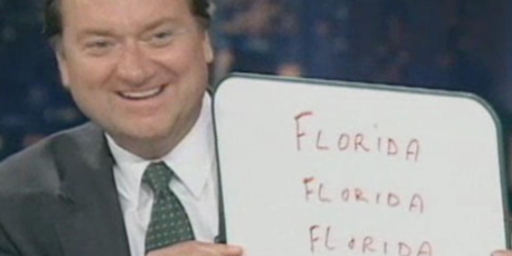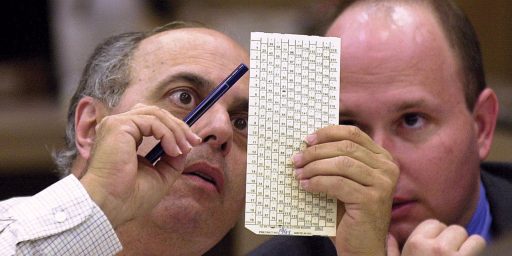ELECTIONS AND RULES
I shouldn’t be surprised that the friendly discussion with Brad DeLong on what the 2000 election demonstrates with regard to US political stratification has reopened the “Bush lost” debate. While granting that I’d have been more upset with what John Constantine describes (in the comments) as a “technical victory” if my guy had lost, I think it’s important to understand that there is no “right” way to determine electoral winners.
Many European (and other) states use a proportional representation model. In many ways, that’s “fairer” than the single member district model that the US employs. In our system, someone who prefers, say, Ralph Nader is forced to either “waste” his vote or instead chose the least objectionable major party candidate. If the US had a PR system, Gore would likely have emerged as the winner by putting together a coalition with the Green forces after the election.* Indeed, given the results of the 2000 contest, that might have been a more “fair” outcome. But PR systems often result in the tail wagging the dog–the fringe groups having disproportionate power because they can take their ball and go home.
For presidential contests, we use the rather archaic Electoral College system, in which the several States are given the power to vote for president. Indeed, there is no constitutional requirement whatsoever that forces the States to even hold elections for this function. As it turns out, 48 of the 50 states plus the District of Columbia have chosen to allocate their votes (1 per Congressional District plus the two Senatorial seats) in a winner-take-all fashion. Two, states, Maine (since 1972) and Nebraska (since 1996) have decided instead to apportion their two Senatorial votes at large while dividing their Congressional District votes based on the outcomes in those Districts. Either method is perfectly valid, as long as the rule is made before the election.
Other systems, including France, Russia, and most US State level primaries, employ a double ballot sytem, wherein a majority vote is needed to win, so a run-off is held between the top two vote getters if no one gets a majority on the first ballot. In many US elections, no candidate gets a majority of the vote, because “third party” candidates siphon off some votes from the two major party candidates, but the plurality winner “takes all”. Indeed, it’s conceivable that California will elect a governor this October who gets only 10-15% of the vote!
Remember, too, that the rules of the game effect the strategy. Candidates will run in order to win under the rules. So, in our Electoral College system, there isn’t much incentive for Republicans to campaign in DC or Democrats in Utah. Now, they’ll both get votes in those places and, in tight races, getting out the vote there might be useful–if it were run as a nationwide contest. It is not. Bush didn’t spend much time campaigning in Texas in 2000, for example, and the vote there was likely suppressed somewhat given the inevitability of the outcome.
The fact is there are numerous plausible ways to allocate votes and determine elections. The mathematician John Allen Paulos makes this case persuasively in his book A Mathematician Reads the Newspaper, in which he defends, among other models, Lani Guinier’s controversial multiple vote schema. Again, as long as the rules are agreed upon in advance, the system is legitimate.
In close sporting events, odd outcomes happen routinely. Football games are often won by the team that amassed fewer offensive yards. Baseball games are often lost by teams that got more hits. But those things, while instrumental in the playing of the game, aren’t the object of the game. Indeed, one joke that was going around during the recount debacle was that the Mets really won the 2000 World Series using Gore’s logic. A law review article on this theme can be seen here. Another variant of this joke can be seen here.
*This is a bit strained, as PR systems are generally (always?) used in the context of a parliamentary system.
Update (1708) New York Times:
National Desk | November 12, 2001, Monday
EXAMINING THE VOTE: THE OVERVIEW; Study of Disputed Florida Ballots Finds Justices Did Not Cast the Deciding VoteBy FORD FESSENDEN and JOHN M. BRODER (NYT) 2527 words
Late Edition – Final , Section A , Page 1 , Column 1
ABSTRACT – Comprehensive review of uncounted Florida ballots from 2000 presidential election, conducted by consortium of eight news organizations and professional statisticians, indicates George W Bush would have won election even if US Supreme Court allowed statewide manual recount of votes ordered by state Supreme Court; finds, contrary to allegations by partisans of Vice Pres Al Gore, that Supreme Court did not award election to Bush; says that Bush would have retained slender margin if Florida court order to recount more than 43,000 ballots was not reversed by Supreme Court, and that even under strategy Gore pursued at beginning of standoff, of filing suit to force recounts in four predominantly Democratic counties, Bush would have retained lead; says close examination of broader group of rejected ballots than those covered in court decisions shows Gore might have won if courts ordered full statewide recount of all rejected ballots, and if he pursued in court action he publicly advocated of calling on state to count all votes; finds statistical support for complaints of many voters, particularly elderly Democrats in Palm Beach County, who said in interviews after election that confusing ballot designs may have led them to spoil their ballots by voting for more than one candidate; charts; photos (M) A comprehensive review of the uncounted Florida ballots from last year’s presidential election reveals that George W. Bush would have won even if the United States Supreme Court had allowed the statewide manual recount of the votes that the Florida Supreme Court had ordered to go forward.Contrary to what many partisans of former Vice President Al Gore have charged, the United States Supreme Court did not award an election to Mr. Bush that otherwise would have been won by Mr. Gore. A close examination of the ballots found that Mr. Bush would have retained a slender margin over Mr. Gore if the Florida court’s order to recount more than 43,000 ballots had not been reversed by the United States Supreme Court.
Update (1927): Steven Taylor has more data at Poliblog.




PR systems are often used in presidential system as well. Most Latin American states use PR and all are presidential systems. A European example would be Switzerland.
Well, as I said, I actually agree with the electoral college – it is an edge detection mechanism similar to what is used in a lot of neural nets. But my point is, that one shouldn’t really be crowing about winning with the minority of the votes. And a strategy that is based on the electoral college is one of magnifying the divisiveness in key states… Again, while a valid strategy, it seems to go against the larger goals of “uniter, not a divider” and an appeal to the majority. I’m not complaining about 2000, just looking at 2004 and wondering why the heck anyone would find a lot of pride in winning this way – democrat or republican.
Steven: Good to know!
John: I understand your point. I don’t think anyone is crowing about it or hoping for a squeaker repeat. Brad’s point is that 2000 actually showed the country being much less divided than the pure red-blue map shows. He’s right. But purple also obscures the fact that there is/was geographical diversity.
And it’s not just a matter of trying to divide and conquer. That won’t work given the diverse coalition one needs to win 270 EC votes. Indeed, it actually means largely ignoring one’s base–and the opponents’–and concentrating on the states that are “in play.”
I found the map I was looking for, found by one of the commentors to Brad’s latest post.
Whoops, the image didn’t show up, so here’s the link
You guys can beat this in the ground but you can’t change the simple facts:
1) Yes we really are divided no matter what color you make the states. The purple map has been around for years now. You can make the case that a 2 tone map is not gradated finely enough but the county by county shows the separation and that is about as fine as you can gradate it.
2) Bush won the freaking election, quit crying about it.
3) John is just bitter and I guess always will be.
4) Other systems exist. We use this one. No amount of whining about it is going to change that.
5) If the rules of ther elction were “Majority” and and not EC BOTH (THAT IS BOTH) of the campaigns would have been run COMPLETELY differently from the ground up rendering any speculation about the outcome sheer folly.
Are we done yet?
Paul
and James- There might have actually been a discussion of the EC vs Majority models had the Dems not whined over Florida for months. (er make that years, see above) There was so much noise about Florida that the relative merits of the EC got dissed. But… It was proably for the best. 😉
There is no right way to determine the results of the election, but there are *many* wrong ways.
For Antonin Scalia to elect George W. Bush and base his decision legal principles–equal protection–that he doesn’t believe have any force is one of the wrong ways…
Brad,
I agree that the rationale put forth by the Court wasn’t the best. OTOH, it’s a far reach from that to say Scalia elected Bush. The following facts are not in dispute:
1. Bush was ahead after the initial vote in Florida.
2. Bush was ahead after the corrected vote in Florida.
3. Bush won Florida according to all the post-election media recounts. See this PBS summary: http://www.pbs.org/newshour/bb/media/jan-june01/recount_4-4.html
Indeed, Gore was never ahead at any time. All the SCOTUS did was to stop yet another recount. That, as it turns out, Bush was going to win.
Now, it’s quite arguable that Gore would have won Florida had people in West Palm executed their ballots properly, but that’s not anything over which Scalia had control.
Brad and all others that still labor under the misconcepton that Gore somehow won…
I urge you to follow these steps:
1) Read James’ last post.
2) If you still feel the need to reply, repeat step 1.
Let me remind you that it was GORE who brought it to the SCOTUS. Whining about Scalia and/or Bush just makes you look foolish and petty.
You can’t complain that a court decided the outcome when your side took it to that court.
As James about about 10 million other people have explained… Even if the courts never got involved and they recounted 10 times, GORE STILL LOST!
Get over it.
Paul
Gee Paul, me thinks the man protesteth too much. I *am* over it. I only bring up the last election to note that Bush won with a *minority* of the popular vote. I wasn’t bitching about that, only pointing out that it isn’t a majority, just a majority of the electoral college (which I actually agree with). So, why don’t you get over it?
You are correct John. Many protest too much. They whine about Scalia they whine about Bush they whine about Buchanan. They whine about everything that has no basis in reality. And it really wears on my nerves.
When people say, “For Antonin Scalia to elect George W. Bush” it is just foolishness.
Even if the whole freaking court went the other way… Guess what?? Gore lost.
And when you say that “rocks and trees” voted for him you look equally as foolish.
Do you think it OK to disparage people because of their state?
Would you disparage gay people or black people that way?
Paul
I never said rocks n’ trees voted for him. I was merely pointing out that square footage does not equate one to one with votes. And that anyone holding up a square footage map and proclaiming “See? We’re a majority!” is simply smoking crack.
I never said rocks n’ trees voted for him.
My humble apologies…
Some other guy named John with your email address said:
“And I do find it a bit odd that people seem to be spending so much time showing how many rocks and trees voted for Bush when in fact they really aren’t registered voters.”